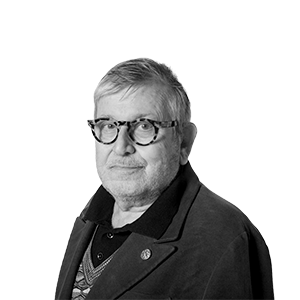

With the novel Scenarios Toni Sala completes his trilogy, which began with The boys and continued with Persecution. I sincerely believe that Scenarios It's the best. As I said in the title of that paper, I think it's a great novel. And it is so because of its content and the way it's written. The content is nothing less than a magnificent portrait of our country, of its current moment in which everything seems to have been in vain, in which people, starved, wander sleepwalking through their daily lives, as they say, aimless and without hope. Toni Sala achieves this portrait in a masterfully constructed way. Five main characters intertwined by thoughts and memories, by an imagination that jumps from one of their minds to another and weaves a story that can't be put down. Characters and landscapes, or if you will, intimately intertwined settings that make up an unforgettable text. There is a fabric that the language sustains, an exact language, with forays into the most degraded Catalan of today's youth, but rich when the speaker is an educated person or is the voice of a narrator who doesn't hesitate to infiltrate the voice of the characters without us realizing it. Reading'Scenarios It demands attention, of course. It's a great book that, when you delve into it, demands attention. Then the work unfolds and escapes, and it draws you in, provoking the mental pleasure of what it says and the literary pleasure of how it says it—if these two aren't one and the same. Reading it, it seemed to me that Toni Sala was using the old technique of the oratorio: a continuous musical fabric, made of language and scenery, which announces and introduces the characters' arias. These arias reflect and narrate. There's an entire chapter, titled "The Letter," which is the aria alone, perfect, linguistically indecisive, just as the character requests, emotive to the maximum, which the author's skill utilizes to define and expand on this character. The author uses these arias to construct a portrait of the country. An aria about theater, for example, in which the protagonist, who is an actor, explains, with all the ers and uts, his training, his history, and the very constitution of the theatrical act. There's another great aria about language, served as one of the monologues the actor recites. There's also an aria about the country's sexual reality, about the rejection of motherhood, about homosexuality, and dissatisfaction with one's own gender. A harsh perspective through the eyes of a nurse, a character obsessed with being a mother and not breaking the bloodline.
It all begins with a wild boar, an animal that comes across the protagonist as he runs at night, along a secondary road in the Pyrenees, alongside his Audi. The setting is splendid: a forest full of shiny, black fir trees near Puigcerdà. Another of the arias, shorter, is a speech given by an old man. biker, whose name is Molles, after a concert, as the audience is leaving, which is significant, because the speech, the aria, is about political disillusionment, and that no longer interests anyone.
The most endearing character in the novel is, for me, poor Vadó, a boy in his thirties, unhappy, lonely, in love, and unrequited. He's the one who writes the letter that constitutes an entire chapter of the novel. It must be said that this boyfriend is obese, as is Olga, with whom he has sexual relations. Vadó is a born loser. Olga, the nurse, is the one obsessed with motherhood. But I don't want to give anything away. Now you have to be very careful not to be accused of giving away spoilers. No. Up until now, I've been very careful not to give too much away. But in this case, the fibers of this novel are so narrow, the fabric so dense, that perhaps it would be appreciated if someone could discern the interweaving a little. Someone would build the bridges between characters and settings, between memories and desires.
The other night, when I was having trouble sleeping, based on my idea of an oratorio novel, I distracted myself by attributing vocal ranges to the protagonists. Tomás, the actor, should be a baritone, Vadó was, without a doubt, the tenor, and Olga, the soprano. Molles, the one in the political aria, should be a bass, and his wife, Marta, who also sings a shorter aria, could be a mezzo-soprano. You can see how much fun we old people have, turning a novel into an oratorio and finding the right range for each voice.
Well, all this aside, while I was reading Scenarios, was becoming increasingly important to me. I saw it as one of the great novels of Catalan literature.
